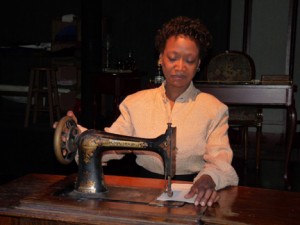 Lynn Nottage, author of “Intimate Apparel,†just won a Pulitzer Prize this year for drama, which was given to her for an off-Broadway hit called “Ruined.†High praise to be sure, but as if that weren’t enough, a new production of “Intimate Apparel†by the Heights Players in Brooklyn demonstrates just how deserving Nottage is of that prestigious honor, if only in a negative sort of way: The abilities of the actors are such that her material has to do all the heavy lifting. Some of the performances are stronger than others, but Nottage’s play holds water from start to finish.
Lynn Nottage, author of “Intimate Apparel,†just won a Pulitzer Prize this year for drama, which was given to her for an off-Broadway hit called “Ruined.†High praise to be sure, but as if that weren’t enough, a new production of “Intimate Apparel†by the Heights Players in Brooklyn demonstrates just how deserving Nottage is of that prestigious honor, if only in a negative sort of way: The abilities of the actors are such that her material has to do all the heavy lifting. Some of the performances are stronger than others, but Nottage’s play holds water from start to finish.
Though it’s not much of a character study, most of the drama here depends on its heroine, Esther (Sandra Williams), a seamstress living in New York in 1905 who’s saving up money to invest in a salon. She goes about her work quietly in her room at Mrs. Dickson’s (Kim Gardner) boarding house, where she gets a series of letters from George Armstrong (Luke Forbes), a long-distance love interest who works in Panama. Not knowing how to read or write but desperate to reply, Esther asks for help from Mrs. Van Buren (Ashley Herron), a client who agrees to write the letters herself.
As she and George develop a bond through their letters, Esther pays regular visits to a fabric store run by Mr. Mark (Hugh Tipping), who’s as kind as he is timid. Even though it looks as if there’s something between them, a relationship doesn’t seem possible considering that she’s black and Mr. Mark’s Jewish, although her closest friend, a prostitute named Mayme (Shatara Hale), assures Esther that she has slept with all kinds of men. Still, Esther’s relationship with George has grown stronger, and when he says that he’ll come to New York and marry her, she can’t wait to get started on her wedding dress.
Most of the actors here are serviceable enough, though Forbes’ performance as the self-satisfied George is a highlight, as is Hale’s as the uncouth Mayme. Williams, Tipping and Gardner, however, are merely tepid in roles that give them so much more to work with – instead of giving Esther the presence she deserves, all Williams does is keep her head above the water.
The only sour performance here might be Herron’s as the client who becomes a kind of confidante, and even though it’s a relatively small part, it still requires more impetus than she can provide. Thanks to Nottage, though, at least the drama is strong, and she delivers the goods even when the actors can’t.
Photograph taken by Eileen Delgado.

I am pleased that you foound Lynn Nottage’s play Intimate Apparel praiseworthy but puzzled then at the exception you take at the lead performer and over half the cast. True you deservingly praise the work of Luke Forbes and Shatara Hale, exceptionally talented actors who appear at various points throughout the story but you call the lead Sandra Williams “tepid” and lacking in presence. Ms Williams is onstage for the entire running time of the play and her character propels the entire story. I have yet to see a tepid or merely adequate actor who can do that with a new play and have anyone come away feeling they have seen or heard worthwhile writing. Any character who has over 50% of a play’s dialogue (Did you note these are all two character scenes?) and is less than stellar would put an audience to sleep not bring them to their feet at the end of the play. I wonder then indeed about your other judgments.
Many elements go into the production of a play in addition to the writing and the acting. There is the scenery, the lighting, the sound and the costumes e.g. Was it instead one of these that kept you involved enough to listen to Ms Nottage admittedly glorious words delivered in your judgment so inadequately for most of the two and a half hours running time? If so, you failed to acknowledge these designers.
Finally there is the direction and, as the director I chose these talented actors from a pool of very talented African American actors ( you mention that the lead character is black only as a side note despite that fact being so central to the play’s theme) and also chose the white actors. All six exceed my expectations in terms of their performances. If fault is found with a majority of a cast in a city swarming with talented performers, one might question the director’s judgement or ability but despite holding four of the six up to personal ridicule you chose to not question or acknowledge me at all. For that I guess I thank you?
There are many directorial elements that I wish I had the time or perhaps the talent to incorporate into our production of Intimate Apparel but I am fiercely proud of our work and grateful to the actors, designers and staff who put this work together in our community theater and brought Ms Nottage’s play to a new small but appreciative audience.
i do wish that you as a reviewer had the historical, theatrical or community perspective to put this work in context. Thank you.